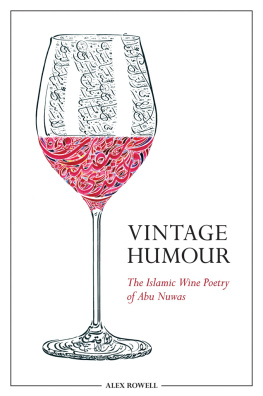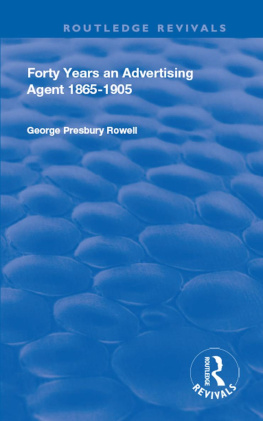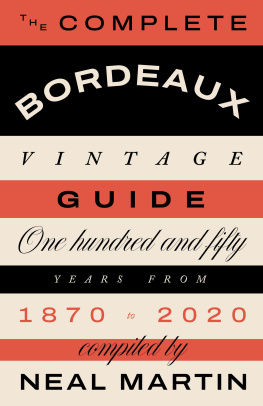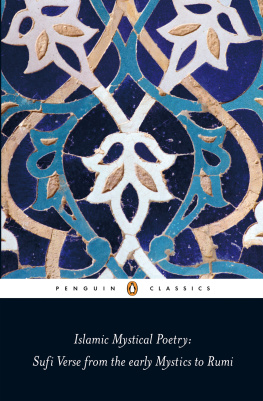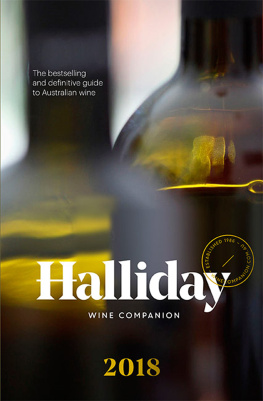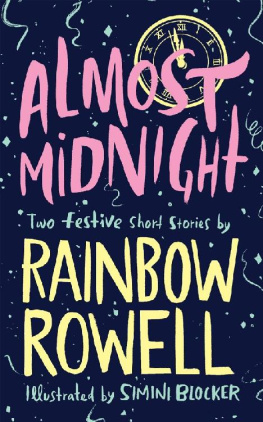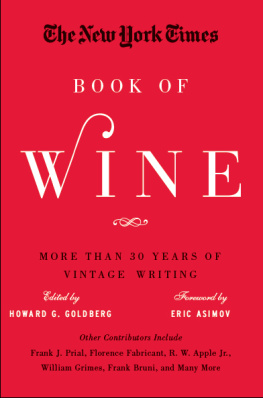Rowell Alex - Vintage Humour: The Islamic Wine Poetry
Here you can read online Rowell Alex - Vintage Humour: The Islamic Wine Poetry full text of the book (entire story) in english for free. Download pdf and epub, get meaning, cover and reviews about this ebook. year: 2017, publisher: C. Hurst and Company (Publishers) Limited, genre: Non-fiction. Description of the work, (preface) as well as reviews are available. Best literature library LitArk.com created for fans of good reading and offers a wide selection of genres:
Romance novel
Science fiction
Adventure
Detective
Science
History
Home and family
Prose
Art
Politics
Computer
Non-fiction
Religion
Business
Children
Humor
Choose a favorite category and find really read worthwhile books. Enjoy immersion in the world of imagination, feel the emotions of the characters or learn something new for yourself, make an fascinating discovery.
- Book:Vintage Humour: The Islamic Wine Poetry
- Author:
- Publisher:C. Hurst and Company (Publishers) Limited
- Genre:
- Year:2017
- Rating:3 / 5
- Favourites:Add to favourites
- Your mark:
- 60
- 1
- 2
- 3
- 4
- 5
Vintage Humour: The Islamic Wine Poetry: summary, description and annotation
We offer to read an annotation, description, summary or preface (depends on what the author of the book "Vintage Humour: The Islamic Wine Poetry" wrote himself). If you haven't found the necessary information about the book — write in the comments, we will try to find it.
Vintage Humour: The Islamic Wine Poetry — read online for free the complete book (whole text) full work
Below is the text of the book, divided by pages. System saving the place of the last page read, allows you to conveniently read the book "Vintage Humour: The Islamic Wine Poetry" online for free, without having to search again every time where you left off. Put a bookmark, and you can go to the page where you finished reading at any time.
Font size:
Interval:
Bookmark:

 HURST & COMPANY, LONDON First published in English in the United Kingdom in 2017 by C. Hurst & Co. (Publishers) Ltd., 41 Great Russell Street, London, WC1B 3PL Alex Rowell, 2017 Printed in the United Kingdom All rights reserved. The right of Alex Rowell to be identified as the author of this publication is asserted by him in accordance with the Copyright, Designs and Patents Act, 1988. A Cataloguing-in-Publication data record for this book is available from the British Library. ISBN: 9781849049931 www.hurstpublishers.com Distributed in the United States, Canada and Latin America by Oxford University Press, 198 Madison Avenue, New York, NY 10016,United States of America.
HURST & COMPANY, LONDON First published in English in the United Kingdom in 2017 by C. Hurst & Co. (Publishers) Ltd., 41 Great Russell Street, London, WC1B 3PL Alex Rowell, 2017 Printed in the United Kingdom All rights reserved. The right of Alex Rowell to be identified as the author of this publication is asserted by him in accordance with the Copyright, Designs and Patents Act, 1988. A Cataloguing-in-Publication data record for this book is available from the British Library. ISBN: 9781849049931 www.hurstpublishers.com Distributed in the United States, Canada and Latin America by Oxford University Press, 198 Madison Avenue, New York, NY 10016,United States of America. To the writers, drinkers, and freethinkers of the Arab and Islamic worlds, long may they live.
Ingrams in his 1933 Abu Nuwas in Life and in Legend. It would be difficult to argue much has changed in the intervening eighty-four years. In which case, before getting into the qualities that make the man so eminently worth knowing the comic genius, the lyric virtuosity, the striking humanism, for a start it may be useful to begin with a quick biographical gloss, which will also necessarily touch on the history of one of human civilisations truly transformational times. Al-Hasan ibn Hani, who would grow up to be nicknamed Abu Nuwas (He of the dangling hair-lock), was born in the late 750s AD probably 757 or 758 This was an extraordinarily tumultuous, as well as propitious, moment for a future writer to be born, being less than a decade after Islams first dynasty (that of the Umayyads, ruling from Damascus) was overthrown by the rebels known as the Abbasids, who would build their own imposing capital from scratch over a then-insignificant site on the banks of the River Tigris called Baghdad. Al-Hasans father, Hani, affiliated with the Yemeni al-Hakam tribe, had been a soldier in the army of the last Umayyad caliph, Marwan ibn Muhammad, until the Abbasid victory in 750 returned him to his Persian wife, Julluban, in Ahwaz. The penurious newlyweds lived a laborious existence; Hani as shepherd and weaver, Julluban as a maker of saddlebags, socks, and possibly bamboo products.
Along with al-Hasan, they are said to have had a daughter and two other sons. Not long after al-Hasans birth, the family moved southwest to Basra, the nearest major city in what was known (even then) as Iraq. Hani would soon die for reasons that remain obscure leaving Julluban to raise the children alone on the fruits of her artisanry. When he was old enough, al-Hasan was sent to the mosque to receive the conventional instruction in reading, writing, and Quran recitation. To grow up in Basra at that time was difficult as many may, regrettably, find it to imagine now to grow up in an exhilarating intellectual, cultural, and socioeconomic hub. As the proud hometown of venerable philosophers, grammarians, and theologians, Basra enjoyed an academic rivalry with its northwestern neighbour, Kufa, analogous to that between Oxford and Cambridge today.
Commercially, as a key maritime port, it was a centre between Syria and Persia, its trade extending eastward to India and China, and westward to the farthest Western countries. leader al-Nafs al-Zakiyya (The Pure Soul) briefly succeeded in seizing Basra and Ahwaz before ultimately being crushed by the Caliph al-Mansur, whose men carried out gruesome reprisals on purported Alid sympathisers in the aftermath. Perhaps most pertinently for the future bacchic bard, Basra was also a distinguished nightlife venue; one of the great metropolises of indulgence, teeming with places of entertainment and outlets of pleasure and causes of temptation and sin. Before very long at all, al-Hasan would be joining the citys literati on their nocturnal tours of the taverns, making the intimate acquaintance of the waiters, singers, and vintners whom he would later portray so vividly in his verse. First, though, he needed to learn the craft, which by all accounts he did with staggering precocity. and jurisprudence, as well as the more secular disciplines of grammar, astronomy, the history and lineages of the old Arab tribes, and, of course, classical poetry. and jurisprudence, as well as the more secular disciplines of grammar, astronomy, the history and lineages of the old Arab tribes, and, of course, classical poetry.
He was at this time handsome-faced, fine-coloured, white and soft of body, slender, with a large head and dangling side-locks, a rhotacism on the letter R so as to make it a gh, and a constant huskiness in his throat. His break, however, would in fact come at the perfume souk, when one of Kufas poetic celebrities, Waliba ibn al-Hubab, chanced to buy some incense sticks from his stall. Striking up a conversation with the youth, Waliba was impressed by his quick wit and knowledge, and offered to mentor him in poetry. Realising who he was, a stunned al-Hasan recited one of his couplets, saying hed hoped to travel to Kufa expressly to meet him one day. Walibas response was to propose he accompany him back to Kufa straight away. With Julluban having by now remarried and abandoned her son to the perfumists, he didnt hesitate to accept.
Under Walibas wing, in Kufa the teenage More would soon follow, and, for all the revelry, Waliba grasped that the young mans talent was exceptional, even unique. Thus did he arrange, at al-Hasans request, for him to spend a year in the desert with the Bedouin to absorb their renowned linguistic purity and peculiar vocabulary. Armed with a now-dazzling lexicon, upon his return from the desert al-Hasan made for Basra to polish his art further still. This he did under the tutelage of a second, and very different kind of mentor, the esteemed literary scholar and poet Khalaf al-Ahmar, whose austere rigour made the ideal complement to Walibas decidedly more informal approach. Khalaf was a philological master of the great tradition of ancient Bedouin poetry and had both the authority and innate skill to round Abu Nuwas poetic education. A popular legend has it that Khalaf refused to allow his disciple to compose anything before he had memorised 1,000 poems from the classical canon.
Font size:
Interval:
Bookmark:
Similar books «Vintage Humour: The Islamic Wine Poetry»
Look at similar books to Vintage Humour: The Islamic Wine Poetry. We have selected literature similar in name and meaning in the hope of providing readers with more options to find new, interesting, not yet read works.
Discussion, reviews of the book Vintage Humour: The Islamic Wine Poetry and just readers' own opinions. Leave your comments, write what you think about the work, its meaning or the main characters. Specify what exactly you liked and what you didn't like, and why you think so.

